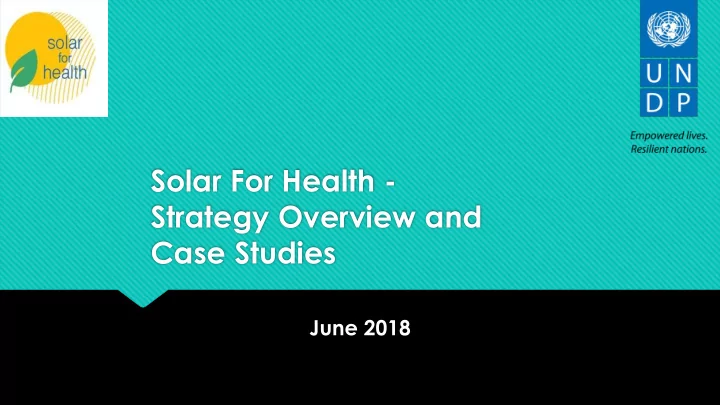

Solar For Health - Strategy Overview and Case Studies June 2018
At A Glance UNDP’s Solar for Health • Programme is currently installing solar panels in health facilities in Zimbabwe , Zambia, Libya , Namibia , Sudan and South Sudan. The programme will soon expand to Angola, Chad, Malawi and Viet Nam. The total installed capacity so • far is 6.5 Mwh, Over 20 million women and • children now have access to quality health services Solar for Health focuses on • installing solar PV systems in health clinics located in the poorest and most remote regions of world, helping to ensure that no one is left behind. Additional demand exists for on-grid facilities (Viet Nam) UNDP has developed a • standardized procurement for the programme, as well as 19 pre-qualified suppliers
RESULTS Countries Health facilities Installed Capacity kWh Zimbabwe 405 4813 Sudan 62 540 Zambia 16 750 South Sudan 33 90 Namibia 5 25 Libya 5 350 Total 525 6568
Solar for Health and the SDGs Solar for Health is contributing to multiple SDGs SDG 3 – Good Health and • Well-Being SDG 5 – Gender Equity • SDG 7 – Affordable and • clean Energy SDG 13 – Climate action • SDG 17 - New Partnerships •
Challenges ▪ Health facilities often face significant power shortages ▪ More than 70% of health facilities in sub- Saharan Africa lack reliable access to electricity, ¼th of facilities do not have access to electricity at all (WHO). ▪ Medicines and Vaccines are stored in poor condition (cold chain), ▪ Utility bills are high and hospitals are in debt, ▪ Health sector contributes to CO2 emission.
Opportunities Solar energy is clean and ▪ reliable. Health facilities powered by solar energy can deliver the quality care needed to save lives . Solar energy saves ▪ money. Compared to traditional sources of electricity, solar energy allows health facilities to allocate funds to other health priorities or to infrastructure. Transitioning from fossil- ▪ based energy to solar energy helps reduce carbon emissions, helping to save the environment .
Case Study: Zimbabwe Solar For Health ▪ Problem: more than two-third of the health clinics in Zimbabwe have limited access to electricity, with only four hours of power supply a day. ▪ Approach: UNDP’s Solar for Health initiative is providing solar energy to 405 HIV clinics in Zimbabwe. ▪ Impact: ▪ Clinics can provide 24/7 health services to the population (pregnant women and children) ▪ Reduced electricity bills up to 60% ▪ Safely store medicines and vaccines, ▪ Available clean water – solar powered water pump
Case Study: Zambia Medical Store Limited ▪ Problem: Medical Stores Limited (MSL) – an autonomous government agency that stores and distributes health products in Zambia – has faced regular power interruptions in the past, preventing them from refrigerating medicines and vaccines. ▪ Approach: UNDP has supported MSL to install 300 kwh solar energy systems and heat shield pain in the central medical warehouses of Zambia. ▪ Impact: The warehouses can guarantee the quality of vaccines and medicines and deliver these products to the populations of the country.
The Solar for Health Investment Case Health Development Increase access to ▪ Create Green jobs, for ▪ health services, Women and Youth especially in remote Increase local and national ▪ areas Technical capacities and Reduce energy ▪ market transformation costs for health Increase demand and ▪ facilities, freeing up uptake of solar technologies resources for other priorities Environment Return on Investment Reduce greenhouse gas ▪ Return on investment is ▪ emissions estimated 2 to 4 years Help protect the local ▪ environment
Next Steps ▪ Increase resource mobilization efforts from domestic resources, private sector international donors and philanthropic foundations ▪ Develop the sustainability framework for the programme ▪ Increase programme visibility at Global and National levels ▪ Conduct the Economic and Environmental benefits analysis of the programme ▪ Continuously promote local ownership
Current Partners Recipient government agencies – MoH, MoEng, MoFin, • Global Fund to Fight AIDS, TB and Malaria • Innovation Norway • Norwegian Solar For Health Consortium • World Health Organization • UNICEF •
CONTACTS Ha ̊ kan Bjo ̈ rkman Executive Coordinator, Global Fund Partnership, HIV, Health and Development Group, UNDP Office in Geneva T + 41 22 917 8539 hakan.bjorkman@undp.org Saleban Omar Senior Programme Advisor, HIV Health and Development Group, UNDP Office in Geneva, T + 41 79 554 62 48 saleban.omar@undp.org 1st Saving Lives Sustainably: Asia Forum 2018 · Sustainable Production in the Health Sector 13-15 June 2018, Manila, the Philippines · #AsiaForum2018
Recommend
More recommend